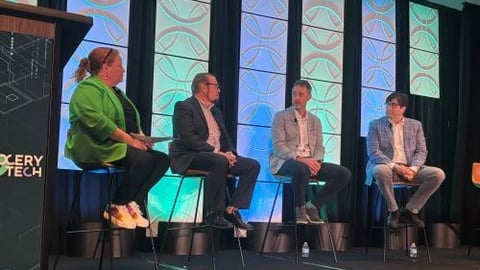A Greener Supply Chain Is Within Reach
Grocers know that they’re not the only ones that need to abide by sustainability standards — every entity with which they do business must win the trust of eco-minded consumers.
Shoppers are more cognizant than ever of how seriously companies take their commitment to the environment, and grocers are in a unique position to help drive the sustainability ship for each company that they do business with.
“According to the World Economic Forum, 65% of consumers want to make the right spending choices to live a more sustainable life. This creates consumer pressure stemming from their expectations and buying habits,” says Neil Coole, director of food and retail supply chain at U.K.-based business improvement and standards company BSI. “Additionally, pressure from regulators, external stakeholders and shareholders is influenced directly or indirectly by eco-minded consumers as well.”
Achieving Transparency
As such, a transparent, sustainable supply chain has become an imperative for retailers. Solutions providers like Crisp are making this more attainable by working with both grocers and manufacturers to strike a better balance between supply and demand.
Barry Bradley, head of supply chain at the New York-based collaborative commerce platform, believes that with real-time visibility at the store and distribution center level, brands and retailers can improve demand planning and production schedules, streamline logistics and transportation, monitor inventory, and refine merchandising — all of which can lead to more sustainable supply chains and reduced waste.
Crisp has worked with Providence, R.I.-based UNFI to roll the solution out to the wholesaler’s suppliers, and by comparing daily inventory and sales forecasts, suppliers can see which products at which distribution centers are at risk of expiring before they’re sold. “With easy access to this information, suppliers can scale back production, reallocate inventory, or run promotions to move items faster and ultimately prevent waste,” Bradley explains.
[RELATED: UNFI, Crisp Unveil New Platform for CPGs]
Likewise, RELEX Solutions offers optimized inventory management, facilitated by intelligent systems that can significantly reduce waste and improve goods flow. According to Svante Göthe, the Helsinki, Finland-based company’s head of sustainability, making informed assortment decisions and educating consumers about the environmental impacts of their food choices are also crucial.
Further, grocers should set high sustainability standards for their partners, Göthe says, adding that collaborating with suppliers to source sustainable ingredients and develop eco-friendly packaging is essential. “With transportation partners, optimizing delivery routes, promoting the use of sustainable transportation modes and consolidating shipments can greatly enhance supply chain efficiency and reduce environmental impacts,” he notes.
BSI’s Coole also believes that grocery organizations can help food, beverage and retail supply chains be more sustainable by developing a replicable best practice model through standardization and collaboration. “Another area grocery organizations can play a role in is around climate change adaptation and horizon scanning — using risk intelligence tools, organizations can make better decisions about their supply chains,” he observes.
Finally, Julia Inés Ocampo Duque, VP of cocoa sourcing and sustainability at Bogota, Colombia-based Luker Chocolate, encourages retailers to look for ways to directly affect sustainability beyond certifications by fostering closer relationships with suppliers, engaging in dialog about shared sustainability goals and initiating collaborative initiatives. Understanding the journey of food from source to shelf can also be key to making informed, ethical decisions, she points out.






